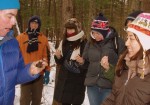In January, ten Harvard students with concentrations ranging from Biology and Applied Math Architecture to Linguistics and Women’s Studies came to the Harvard Forest (HFR) for a week-long experience in “Reading and Conserving the New England Landscape.” The purpose of their visit was to investigate the ecological and societal complexities of the New England landscape—past, present, and future—through hands-on exploration of long-term research experiments and other Harvard Forest landscapes.
Throughout the week, students were guided by an unusual roster of instructors, including several ecologists, an atmospheric biologist, a creative writer, and two visual artists—including the 2011 Harvard Forest artist-in-residence Debby Kaspari, whose work was featured in the recent ”LTER Reflections” exhibit at the National Science Foundation (NSF) headquarters in Washington, DC.
During their time at HFR, Harvard Forest Winter Break students extracted and analyzed archaic sediment cores, learned about the role of forests in carbon cycles and watersheds, discussed future scenarios of forest change, tried their hands at botanical illustration, explored urban design and “road ecology” in several cities and towns, and wrote creatively about their time atop canopy towers, in the lab, and at the research sites in the woods.
Students regularly visit Harvard Forest for educational opportunities centered on long-term research. These activities range from day-long field trips and weekend intensives to the 11 week long HFR Summer Research Program, as well as a new 6-week summer Field School in Archaeology and Paleoecology. Many of these opportunities are open to students outside Harvard University.
Learn more at harvardforest.fas.harvard.edu/education-opportunities.

 Enlarge this image
Enlarge this image
